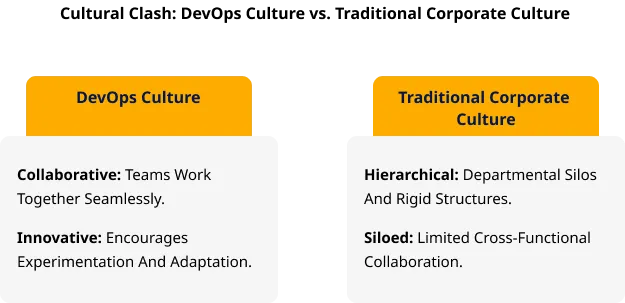Have you ever wondered how leading enterprises like Netflix, Amazon, and Google innovate at lightning speed while maintaining stability?
What’s their secret for balancing agility and reliability?
The answer lies in DevOps. This technology revolution transforms how modern businesses build, test, release, and monitor software.
The Globenewswire post stated that the DevOps market size is expected to grow from USD 10.4 billion in 2023 to USD 25.5 billion by 2028 at a Compound Annual Growth Rate (CAGR) of 19.7%
With DevOps, gone are the days of sluggish software delivery. Now, changes flow rapidly from code to production. But robust automation ensures stability despite this speed.
High-performing teams that adhere to DevOps principles deliver changes 46 times more frequently than low performers and have a change failure rate that is 440 times lower, according to Puppet’s 2023 State of DevOps Report.
Through metrics and monitoring, teams get continuous feedback and quickly improve products per user needs. This cycle of constant learning and refinement creates superior customer experiences.
This post will discuss how DevOps gives enterprises an edge with faster innovation, reliable systems, and delighted customers.
Transforming Enterprise Culture with DevOps
DevOps isn’t just about technology; it’s about changing how businesses operate and innovate.
Here’s a straightforward explanation of how DevOps can reshape an enterprise’s culture to drive growth and business benefits:
1. Collaboration and Communication: DevOps encourages teams to work together seamlessly. Instead of silos, teams from development, operations, and other areas collaborate more effectively.
2. Agile Thinking: DevOps promotes agility, allowing businesses to respond faster to market changes. You can adapt quickly to customer demands and industry shifts. DevOps and Agile can be a great combination to boost your business growth. Our recent blog post on How Agile And DevOps Fuel Rapid Product Development discusses this in detail.
3. Continuous Improvement: In DevOps, there’s a constant focus on making things better. It’s like always striving to improve a recipe until it’s perfect. Businesses can evolve, innovate, and stay competitive.
4. Automation: Automation reduces manual tasks, giving employees more time for strategic work. Think of it as having robots do the repetitive chores, leaving your team to focus on what matters most.
5. Customer-Centric Approach: DevOps places customers at the center. This customer focus drives business growth by delivering what customers want.
6. Quick Feedback Loops: DevOps creates shorter feedback loops, like getting instant feedback on a painting. This helps businesses adapt swiftly, fix issues, and seize opportunities.
- Example: Netflix uses DevOps to deliver a seamless streaming experience. They constantly improve their platform, keeping customers happy and staying ahead in the streaming industry.
Take our quick DevOps Readiness Assessment to identify strengths and areas for improvement.
Overcoming Resistance: Building a DevOps-Ready Team
One significant challenge is overcoming resistance within your team to reap the benefits of DevOps as a service.
Below are some useful points that’ll help you build a team ready to embrace DevOps:
- Education is Key: Begin by educating your team about DevOps and how it can benefit them and the organization.
- Open Communication: Encourage open discussions. Let team members voice their concerns and questions. Such meetings help you address your team members’ concerns better.
- Start Small: Don’t jump into DevOps all at once. Start with a small project or team. Small steps will strengthen your team members and prepare them to tackle more significant issues without challenges.
- Showcase Success Stories: Share success stories from other teams or companies that have embraced DevOps. This shows that it can work and brings inspiration.
- Provide Training: Invest in training to bridge skill gaps. This is one of the best ways to help your team stay updated with the latest DevOps trends in software development.
- Highlight Benefits: Emphasize how DevOps can make your team’s work easier and reduce manual tasks, resulting in better results. After knowing the DevOps benefits for business, your team will be convinced to adopt this revolutionary technology.
- Be Patient: Change takes time. Be patient and allow your team to adjust at their own pace. Everyone has their learning journey; hence, stay calm and wait for fruitful results.
Example: Amazon, known for its e-commerce prowess, embraced DevOps to streamline operations. They started small, improved gradually, and now they’re a global DevOps success story.
Also Read: 25 Best DevOps Companies In India | 2023
Leveraging Automation for Efficiency and Innovation
Automation can work as a catalyst in DevOps for business growth. It’s about using innovative tools and technology to make tasks happen automatically. 
- Streamlined Workflows: Automation takes care of repetitive, time-consuming tasks, freeing your team for more creative and strategic work.
- Consistency and Accuracy: Automated processes don’t get tired or make mistakes. Automating processes can remove the pain of doing tasks manually and ensure error-free work.
- Faster Time-to-Market: With automation, you can deploy software and updates faster. A survey by Digital.ai stated that organizations using DevOps processes have an 84% faster average time to market for new products than those not using DevOps.
- DevOps Monitoring and Logging: Automated monitoring monitors your systems 24/7. It’s like having a security camera that alerts you instantly if something goes wrong so you can take action before it’s a big problem
- Scaling Made Easy: As your business grows, automation scales with you.
- Continuous Improvement: Automation helps identify bottlenecks and areas for improvement. It’s like having a GPS that tells you where you are and suggests faster routes.
Example: Tesla’s cars receive software updates automatically, enhancing features and fixing issues. This delights customers and keeps Tesla at the forefront of innovation.
Start your data-driven DevOps journey with us by defining goals, tracking progress, and maximizing ROI.
Bridging Skill Gaps in Enterprise DevOps
Here’s a clear guide on how to bridge skill gaps in your enterprise when it comes to DevOps and software development services:
- Identify Skill Gaps: First, figure out what skills your team lacks. You must know how many people are unaware of it.
- Invest in Training: Offer training and workshops to your team. Training will ensure they adopt the technology appropriately.
- Certifications: Encourage team members to get certificates. These are like diplomas that prove their expertise, making them more valuable to your enterprise.
- Mentoring: Pair experienced team members with those who need guidance. It will help the teammates learn from the experience of a professional.
- Collaboration: Foster collaboration with external experts or consultants.
- Hands-on Projects: Allow your team to work on real DevOps projects. This will help them to learn real-life cases.
Example: Microsoft Azure provides extensive training and certification programs for Azure DevOps. These resources empower businesses and their teams to bridge skill gaps effectively.
By focusing on these steps, your enterprise can ensure it has the right skills to leverage DevOps for business growth and effectively deliver software development services.
Also Read: Understanding the Difference Between DevOps and DevSecOps
Seamless Integration: DevOps in Existing Enterprise Workflows
Integrating DevOps into existing enterprise workflows might sound daunting, but it can enhance the workflow. Here’s how to do it smoothly:
Assessment: Begin by assessing your current workflows. Understand what’s working and what needs improvement.
Prioritize: Identify areas where DevOps can have the most impact. Start with low-risk, high-reward projects.
Team Collaboration: Get your teams talking and working together to ensure everyone is on the same page.
Tools Integration: Choose DevOps tools that fit into your existing tech stack. Having the right tool can ensure an efficient workflow.
Test and Learn: Start with a pilot project. This will give you an idea of how it will perform among the targeted audience. Learn from the experience and refine your approach.
Continuous Improvement: DevOps is all about continuous improvement. Keep refining your processes constantly to reach perfection.
Examples: Both Amazon and Flipkart, top DevOps companies in India, seamlessly integrated DevOps into their existing workflows. They gradually adopted DevOps practices, which fueled their remarkable business growth.
By smoothly integrating DevOps into your enterprise workflows, you can enhance efficiency, boost productivity, and pave the way for business growth.
Safeguard your digital assets with our DevOps-driven security measures.
Strengthening Enterprise Security with DevOps
Here’s how DevOps can reinforce enterprise security:
- Shift Left Security: DevOps encourages security checks early in development. This ensures that security is ingrained from the start.
- Automated Security Tests: Automation tools can code for vulnerabilities continuously, acting like vigilant guards who monitor your premises around the clock.
- Continuous Monitoring: DevOps provides real-time insights into system behavior. It spots anomalies and alerts you immediately.
- Secure Code Practices: DevOps promotes secure coding practices, preventing vulnerabilities from entering your applications.
Regular Updates: Frequent updates and patches keep systems secure, similar to regular maintenance, to keep your building in top shape.
Examples: Top DevOps companies in India, like Infosys and Wipro, have embraced DevOps to enhance security. They use automated tools and practices to protect their client’s data and applications.
By strengthening enterprise security with DevOps, you safeguard your digital assets and build customer trust.
In the future of DevOps, security isn’t an afterthought; it’s a cornerstone for startups and established businesses.
Speed up your time-to-market with our tailored solutions.
Strategic Technology Selection for Enterprise DevOps
Choosing the right technology for the future of DevOps requires expert knowledge. Here’s a straightforward guide on how to make strategic tech choices for your enterprise DevOps:
Analyze Your Needs: Understand your enterprise’s unique needs and goals. It’s like knowing what projects you’ll build before selecting the right tools.
Evaluate Compatibility: Ensure the chosen technology integrates seamlessly with your existing systems. It will help you find the best technology match without any pitfalls.
Scalability: Consider whether the technology can grow with your enterprise. It’s like investing in machinery that can handle increased production demands.
Community Support: Look for technologies with a robust community and support system. This will ensure you have access to expertise as and when required.
Case Studies: Examine case studies from top DevOps companies like TCS or Tech Mahindra in India. See how they’ve leveraged specific technologies to achieve success in their DevOps initiatives.
Security Features: Security is critical; ensure the technology aligns with your security requirements. This will protect your business from security threats.
Cost-Efficiency: Factor in the total cost of ownership, including licensing, maintenance, and training. Consider it like calculating the long-term operating costs of your machinery.
Proof of Concept: Run a proof of concept before a full-scale adoption. It’s like a test drive before buying a new car.
By following these steps, your enterprise can strategically select technology that aligns with the future of DevOps.
Measuring Business Success: Metrics, KPIs, and ROI
In the evolving future of DevOps, following a roadmap to ensure you’re on the right track is crucial to measure success. Here’s how you can ensure that:
Define Clear Goals: Start by setting specific goals for your DevOps initiatives, just like setting a destination on your GPS. Know where you want to go.
Key Performance Indicators (KPIs): Identify KPIs that align with your goals. These are like signposts on your journey, showing progress.
Monitoring and Data: Implement robust monitoring and data collection systems akin to tracking your journey’s progress with a GPS. This data guides your decisions.
Regular Assessments: Continuously evaluate your KPIs against your goals.
Return on Investment (ROI): Calculate the ROI of your DevOps efforts. Compare the benefits to the costs to evaluate if the investment is worth the expenses.
Adjust and Improve: Adjust your DevOps strategy based on your measurements. It is often called being ‘flexible.’
Continuous Improvement: DevOps is a journey, not a destination. Keep refining your goals, metrics, and strategies for ongoing success.
Also Read: DevOps For Startups: Best Practices And Real-Life Examples To Accelerate Growth
Compliance, Governance, and DevOps in the Enterprise
In the context of DevOps, compliance and governance are like the rules and regulations that keep a business in check.
Here’s a simplified explanation of how they fit into the enterprise landscape:
Compliance Requirements: Enterprises, especially those in regulated industries like finance or healthcare, have specific rules they must follow.
DevOps Alignment: DevOps practices should align with these compliance requirements.
Automation and Auditing: DevOps introduces automated processes that can be closely audited. This is like having a digital paper trail for all your financial transactions.
Continuous Monitoring: Continuous monitoring is crucial for both security and compliance.
DevOps Consulting & Development Company: When navigating the complex world of compliance and governance, enterprises often seek DevOps consulting & development company guidance.
Hire Top DevOps Engineers India: Enterprises looking for expertise often opt to “hire top DevOps engineers India” due to the availability of highly skilled professionals.
Integrating compliance and governance into your DevOps processes creates a secure, rule-abiding environment.
Conclusion
The pace of change today demands that companies evolve faster than ever.
DevOps practices make this accelerated speed-to-innovation possible, fueling business growth for enterprises and powering the agility startups need.
It unlocks greater productivity, quality, and velocity by optimizing the development lifecycle through robust CI/CD, test automation, and cross-team collaboration.
DevOps for startups can unlock many opportunities, helping them reach the right audience.
Thus, it’s ultimately about culture even more than technology. Unified teams with shared purpose and creativity can unlock their full potential.
ValueCoders’ team has been empowering businesses for years by helping them implement DevOps in their business.
Approach DevOps as a continuous journey of improvement using emerging tools and techniques.
As you optimize, business performance improves. The future moves fast – and DevOps ensures you move faster.











